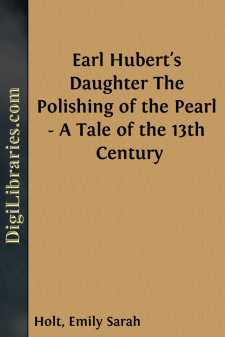Categories
- Antiques & Collectibles 13
- Architecture 36
- Art 48
- Bibles 22
- Biography & Autobiography 813
- Body, Mind & Spirit 142
- Business & Economics 28
- Children's Books 15
- Children's Fiction 12
- Computers 4
- Cooking 94
- Crafts & Hobbies 4
- Drama 346
- Education 46
- Family & Relationships 57
- Fiction 11828
- Games 19
- Gardening 17
- Health & Fitness 34
- History 1377
- House & Home 1
- Humor 147
- Juvenile Fiction 1873
- Juvenile Nonfiction 202
- Language Arts & Disciplines 88
- Law 16
- Literary Collections 686
- Literary Criticism 179
- Mathematics 13
- Medical 41
- Music 40
- Nature 179
- Non-Classifiable 1768
- Performing Arts 7
- Periodicals 1453
- Philosophy 64
- Photography 2
- Poetry 896
- Political Science 203
- Psychology 42
- Reference 154
- Religion 513
- Science 126
- Self-Help 84
- Social Science 81
- Sports & Recreation 34
- Study Aids 3
- Technology & Engineering 59
- Transportation 23
- Travel 463
- True Crime 29
Earl Hubert's Daughter The Polishing of the Pearl - A Tale of the 13th Century
by: Emily Sarah Holt
Categories:
Description:
Excerpt
Preface.
The thirteenth century was one of rapid and terrible incidents, tumultuous politics, and in religious matters of low and degrading superstition. Transubstantiation had just been formally adopted as a dogma of the Church, accompanied as it always is by sacramental confession, and quickly followed by the elevation of the host and the invention of the pix. Various Orders of monks were flocking into England. The Pope was doing his best, aided by the Roman clergy, and to their shame be it said, by some of the English, to fix his iron yoke on the neck of the Church of England. The doctrine of human merit was at its highest pitch; the doctrine of justification by faith was absolutely unknown.
Amid this thick darkness, a very small number of true-hearted, Heaven-taught men bore aloft the torch of truth—that is, of so much truth as they knew. One of such men as these I have sketched in Father Bruno. And if, possibly, the portrait is slightly over-charged for the date,—if he be represented as a shade more enlightened than at that time he could well be—I trust that the anachronism will be pardoned for the sake of those eternal verities which would otherwise have been left wanting.
There is one fact in ecclesiastical history which should never be forgotten, and this is, that in all ages, within the visible corporate body which men call the Church, God has had a Church of His own, true, living, and faithful. He has ever reserved to Himself that typical seven thousand in Israel, of whom all the knees have not bowed unto Baal, and every mouth hath not kissed him.
Such men as these have been termed “Protestants before the Reformation.” The only reason why they were not Protestants, was because there was as yet no Protestantism. The heavenly call to “come out of her” had not yet been heard. These men were to be found in all stations and callings; on the throne—as in Alfred the Great, Saint Louis, and Henry the Sixth; in the hierarchy—as in Anselm, Bradwardine, and Grosteste; in the cloister—as in Bernard de Morlaix; but perhaps most frequently in that rank and file of whom the world never hears, and of some of whom, however low their place in it, the world is not worthy.
These men often made terrible blunders—as Saint Louis did when he persecuted the Jews, under the delusion that he was thus doing honour to the Lord whom they had rejected: and Bernard de Morlaix, when he led a crusade against the Albigenses, of whom he had heard only slanderous reports. Do we make no blunders, that we should be in haste to judge them? How much more has been given to us than to them! How much more, then, will be required?
Father and Mother.
“He was a true man, this—who lived for England,
And he knew how to die.”
“Sweet? There are many sweet things. Clover’s sweet,
And so is liquorice, though ’tis hard to chew;
And sweetbriar—till it scratches.”
“Look, Margaret! Thine aunt, Dame Marjory, is come to spend thy birthday with thee.”
“And see my new bower?...












